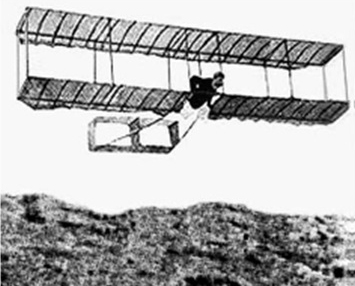
George
Augustine Taylor takes to the air from the dunes at North
Narrabeen
in December, 1909 - becoming the first man to fly in Australia
in a heavier-than-air "aircraft"
SO,
almost 40 years later, have I now got an answer to the
question I was asked at that basement literary salon in
Chelsea in London in 1975?
"What is Kangaroo about, Mr Darroch?"
Well, yes, I think I do now know what Kangaroo
is "about".
Of course, novels can be, of themselves, "about"
many things.
When written by skilled and gifted authors, novels are,
almost inevitably, complex creations, exploring or raising
a range of issues or themes.
No major novel is "about" one thing. (What is
Middlemarch or The Return of the Native
about?)
Yet to ask the question "what is the novel about?"
is neither an idle nor a fatuous one. A novel should have
at least one distinctive, identifiable theme.
So the question raised by that literary lady in Chelsea
in 1975 is not an unreasonable one, and I think it behoves
me now to try to provide an answer to it…
…particularly given the amount of time and effort
I have spent (assisted by my team of collaborators) looking
into the novel's content and provenance.
And I think that those reading this "monograph"
will have by now an inkling of what I think the answer
is.
It is to be
found, I believe, in the quote from the last chapter of
the novel which I have harked back to, again and again,
throughout the text, and which supplies the title to this
work, and its cover-illustration…
It was as if the silvery freedom suddenly turned,
and showed the scaly back of a reptile, and the horrible
paws. |
It
is the spectre of that baleful reptile that still haunts
Friend family, and which also stalked a considerable segment
of Sydney and NSW middle-class society between the wars…and
perhaps beyond.
Because Lawrence's autobiographical novel Kangaroo
is, at bottom, about fascism in Australia, and perhaps
about fascism more generally.
